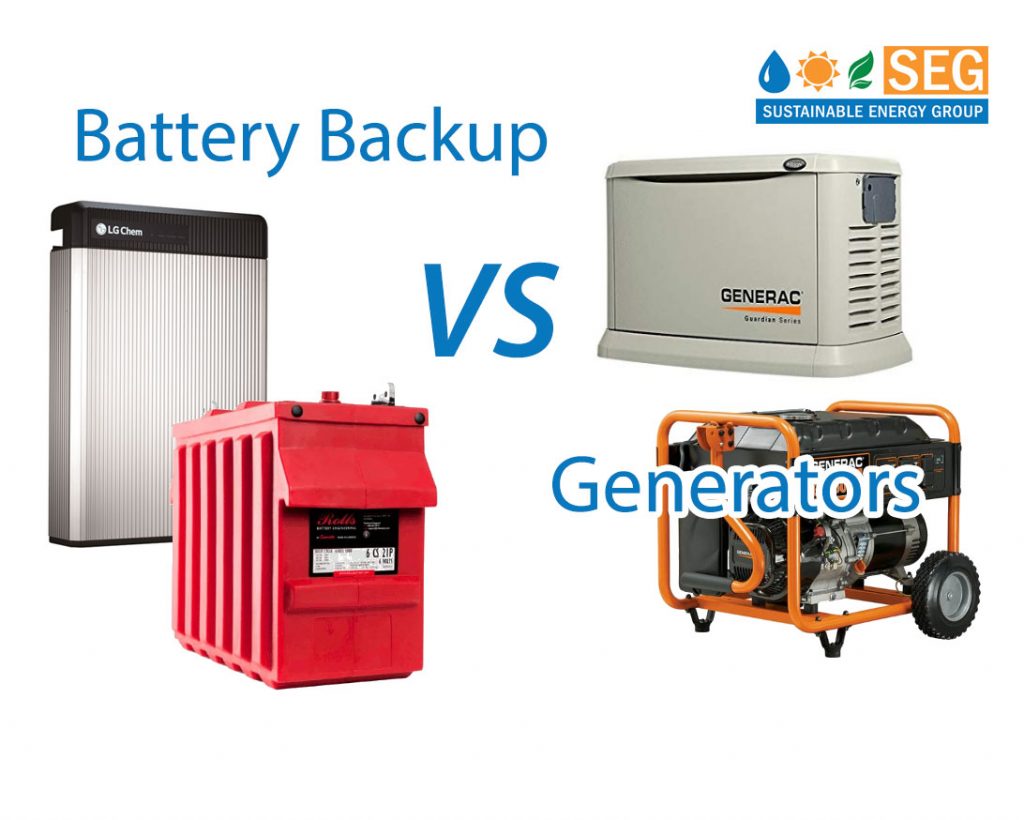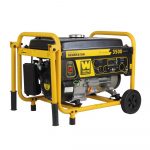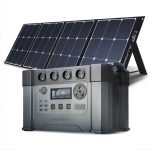When it comes to choosing a generator, the most common debate is whether to go with a battery or gas-powered generator. Each has its own advantages and disadvantages, so which option is best ultimately depends on your needs. Battery-powered generators are more efficient, quieter, and have zero emissions, making them a great option for those who are environmentally conscious. They are also more portable than gas-powered generators, so they can be used in areas where gas is not available. On the other hand, gas-powered generators are more powerful and offer longer run times.
They are also typically less expensive than battery-powered generators, making them a good choice for those on a budget. The most important thing to consider is how you plan to use the generator. If you need a generator for occasional use, a battery-powered generator could be the best option. However, if you need a generator for more frequent use, a gas-powered generator may be the better choice. It’s important to take your time to weigh the pros and cons of each option before making your decision. Ultimately, the best generator for you will depend on your specific needs and budget.
Why a generator is better than a battery?
Generators are a great alternative to batteries in many situations. Generators provide a reliable power source that can be used over long periods of time without needing to be replaced. Unlike batteries, generators are able to generate electricity from a variety of sources, including gasoline, diesel, natural gas and even solar energy. Generators also provide a much larger power output than batteries, allowing them to power larger appliances like air conditioners, microwaves, and more. Generators are also more reliable than batteries.
Batteries are prone to going dead and needing to be recharged which can be a hassle. Generators, on the other hand, require much less maintenance, and can last for years with proper maintenance. Generators are also much more cost-effective than batteries. Generator fuel costs are often lower than the cost of recharging batteries, and generators can be used over long periods of time without needing to be replaced. Finally, generators are much easier to use than batteries. Generators can be connected to appliances directly, while batteries have to be recharged and connected to the appliance separately. This makes generators much more convenient and easy to use. In conclusion, generators are much better than batteries when it comes to providing electrical power. They are more reliable, cost-effective and convenient to use than batteries, making them the ideal choice for many applications.
What is the disadvantage of generator?
Generators, while convenient and efficient, come with their own set of drawbacks. When compared to batteries, they can be more expensive and have a larger environmental footprint due to the noise they create and the fuel they require. Additionally, generator sets are typically bulky and require maintenance and servicing. Generators also require fuel, which can become expensive in certain situations. They can only produce electricity when they are running, while batteries can store that energy for times when the generator isn’t running.
This means that when the generator is not running, there will be no power. Generators also tend to be louder than other forms of power generation and can cause a disturbance to nearby residents. Noise regulations must be followed to ensure compliance with local laws. The fuel used for generator sets is typically diesel or gasoline, which are not very environmentally friendly. The combustion process of these fuels creates emissions that can be hazardous to human health. Finally, generators require periodic maintenance and servicing. This includes changing the oil and filters, refilling the fuel tank, and checking the spark plugs. This risk and expense must be considered before investing in a generator set. In conclusion, while generators are a reliable form of power, they come with their own set of drawbacks that must be taken into consideration. They require fuel, are loud, and require periodic maintenance. When compared to batteries, they can be more expensive and have a larger environmental footprint.
Can a battery replace a generator?
When it comes to powering different types of machines and devices, batteries and generators are two of the most common power sources. But can a battery replace a generator? In some cases, it can. Batteries are able to store energy and generate power for a short period of time. Thus, in cases where you need to generate a small amount of electricity for a short period, a battery can be a good alternative to a generator. However, in most situations, a generator is a better option.
Generators are able to produce a much larger amount of energy than batteries, and they can do it continuously over a longer period of time. This makes them ideal for powering larger machines, as well as providing a backup power source in case of an emergency. In conclusion, batteries and generators have their own strengths and weaknesses. Generators are generally the more powerful option, but if you need a small amount of electricity for a short period of time, a battery can be a suitable alternative.
How long will a battery generator last?
When it comes to battery vs generator, the length of time a battery generator will last depends on a few factors. The type and size of the battery, how often it needs to be recharged, and how much power is being drawn from it all play a part. Generally speaking, a battery generator will last anywhere from a few hours to several days depending on the type of battery used and how much power is being drawn from it. Smaller, lightweight batteries tend to have a shorter lifespan than larger, heavier-duty batteries. The same can be said for how often the battery needs to be recharged.
If it is constantly being used, it will likely need to be recharged more often, thus reducing its lifespan. If it is properly maintained and cared for, a battery generator can last anywhere from two weeks to several months, depending on the type of battery used and how much power is being drawn from it. Ultimately, it all boils down to the type of battery generator you are using and how much power is being drawn from it. With proper maintenance and care, you can expect your battery generator to last for an extended period of time.
Can a battery-powered generator run a refrigerator?
When it comes to the debate of battery vs generator, one of the main questions is whether a battery-powered generator can run a refrigerator. The answer is yes, depending on the size and power of the generator. Generally, the bigger the generator, the more power it has, and thus the more appliances it can power. A battery-powered generator is less expensive than a traditional generator and is more eco-friendly because it does not use gasoline or produce exhaust fumes. They are also easier to transport, making them ideal for camping trips or other outdoor activities.
However, the downside is that a battery-powered generator will not run as long as a traditional generator, and the battery must be recharged periodically. This means that a battery-powered generator may not be able to run a refrigerator for an extended period of time. If you’re looking for a reliable source of power for a refrigerator, a traditional generator may be a better choice. They can run for longer and have more power, making them capable of powering larger appliances. In conclusion, a battery-powered generator can run a refrigerator, but the duration and power output will depend on the size and power of the generator. They are more affordable, eco-friendly, and easier to transport than a traditional generator, but they may not be able to power larger appliances or run for extended periods of time.
What is the best backup source for a power outage?
When it comes to backups for a power outage, battery power and generators are both viable options. Batteries are a great choice for shorter outages, as they are convenient and easy to use. They can provide power for a few hours or even days depending on the capacity of the battery. Batteries are also relatively inexpensive and require minimal maintenance. Generators are typically used for longer outages since they can provide a more reliable and consistent source of power.
Generators are more expensive than batteries and require more maintenance, but they can last for months or even years. When deciding which backup source is best for a power outage, it really depends on the length of the outage and the budget. Batteries are great for short outages, but generators are better for longer outages. If you are on a tight budget, batteries may be the better option. However, if you have the resources, a generator may be more ideal. Overall, both batteries and generators are good options for power outages. It is important to do your research and consider the length of the outage and your budget before selecting the best solution for your needs.
Can a battery powered generator run a house?
Battery powered generators can be used to run a house, but they are not as efficient as traditional generator models. Battery powered generators are great for emergency power outages, but they don’t produce as much energy as a traditional generator. The main benefit of a battery powered generator is its portability. They are quieter and easier to move than traditional generators. They also don’t require fuel or routine maintenance.
However, battery powered generators are not able to sustain a constant output of power. They also have a limited power output and can only run a few appliances at a time. The battery life of the generator is also limited and needs to be recharged often. Overall, a battery powered generator can be used to run a house, but it is not the ideal choice. Traditional generators are the better option to provide consistent power output and are more reliable over a longer period of time.
Can a battery powered generator run a refrigerator?
With regards to a refrigerator, can a battery powered generator run it? The answer is yes, it is possible to run a refrigerator with a battery powered generator. However, it depends on the size and type of refrigerator as well as the capacity of the generator. If the generator has a high enough wattage output and the refrigerator is of an appropriate size, then the battery powered generator should be able to do the job. It is important to note that the battery powered generator is not as powerful as a regular gasoline powered generator. As such, the refrigerator may not run perfectly.
It may run slower or be more noisy than if it were powered by a regular generator. It is also important to make sure that the battery powered generator is well-maintained and working properly. When using a battery powered generator, it is important to keep an eye on the battery level, making sure it is charged and as full as possible. Overall, a battery powered generator can run a refrigerator, but it does come with some limitations. It may not be as powerful or efficient as a regular generator, and the battery needs to be monitored and maintained for optimal performance.
Is it cheaper to run a generator or a battery?
When it comes to battery vs generator, it is important to consider the cost of running one or the other. A generator is typically more expensive to run, as it requires fuel and regular maintenance. On the other hand, a battery powered system requires an upfront cost to purchase the battery, but typically requires much less maintenance and no fuel. In terms of cost, a battery will usually be cheaper to run in the long term. After the initial investment in a battery, the cost of running it is usually much lower than with a generator.
Batteries require no additional fuel and very little maintenance, making them a more cost-effective option. When comparing the cost of running a generator or a battery, it is important to consider the size of your system and the amount of energy required. A generator may be more cost effective for larger systems that require a lot of energy. However, for smaller systems, the battery is likely to be the more economical option. Overall, it is usually cheaper to run a battery than a generator. Batteries require an upfront cost, but overall their running costs are much lower than a generator. For larger systems, a generator may be more cost effective, but for smaller systems, a battery is the more economical option.
What is a battery generator and how does it work?
A battery generator works by storing energy from either renewable sources such as solar or wind, or from other sources such as a power grid. When the battery is fully charged, the stored energy will be used to generate electricity for use in a variety of applications. The main advantage of a battery generator is that it is usually much quieter and smaller than a regular generator. It is also less expensive, since it doesn’t need to be refueled or serviced. The biggest difference between a battery generator and a regular generator is that the battery generator will require regular maintenance and care to ensure that it is working efficiently.
Additionally, the batteries need to be replaced over time as they lose their capacity to store energy. Overall, a battery generator is an efficient and cost-effective way to generate electricity without the need for fuel or regular servicing. It is an ideal choice for people who want to reduce their carbon footprint or who are looking for a more reliable source of power than a regular generator.
Is battery backup power a good alternative to a gas generator?
Battery backup power is becoming increasingly popular as an alternative to gas generators. It’s a great way to provide reliable power in an emergency, with minimal installation and maintenance costs. Battery backup power is also much quieter than a gas generator, so it won’t disturb your neighbors or other people nearby. The biggest advantage of battery backup power over a gas generator is that it doesn’t require fuel. It’s also very efficient in terms of energy consumption, providing reliable power with minimal waste.
Battery backup power also automatically switches on during a power outage, whereas a gas generator needs to be manually started. When it comes to reliability, battery backup power is a great choice. It also has a lower environmental impact than a gas generator, which is an important consideration for those concerned about sustainability. Overall, battery backup power is a great option for those looking for a reliable and efficient source of emergency power. It’s also more cost-effective than a gas generator, with minimal installation and maintenance costs. For those looking for an alternative to a gas generator, battery backup power is definitely worth considering.
Are lithium-ion batteries better than gas-based generators?
When considering the use of batteries and generators for providing power, it is important to understand the pros and cons of each option. Generally speaking, lithium-ion batteries are better than gas-based generators when it comes to providing power. Lithium-ion batteries have a number of advantages over gas-based generators. Firstly, lithium-ion batteries are more efficient in terms of energy production. They require less energy to produce the same amount of power, meaning they are more cost-effective and can be used in a variety of applications.
Additionally, lithium-ion batteries are much quieter than gas-based generators. This makes them ideal for use in residential or commercial environments where noise pollution is a concern. In comparison, gas-based generators tend to be less efficient in terms of energy production and are significantly louder. They also require more maintenance over time as the fuel needs to be refilled and the filters need to be replaced. Overall, lithium-ion batteries provide a more cost-effective and efficient way of providing power than gas-based generators. They also offer a number of other benefits such as being quieter, more environmentally friendly, and requiring less maintenance.
What is better a generator or a battery?
When it comes to finding a reliable source of power, the “battery vs generator” discussion can be quite confusing. Generally speaking, a generator is a power source that produces electricity by converting energy from a fuel source. It typically operates using diesel, petrol, or gas fuels. On the other hand, batteries use stored energy from an external source, such as a solar panel, for their power. When it comes to which one is better, it really depends on your needs and the use case.
Generally speaking, a generator is the better choice for powering large appliances in your home or business, as well as for providing backup power in case of an outage. However, if you’re looking for a smaller and more efficient solution, a battery is the way to go. Another benefit of a battery is that it is typically easier to maintain than a generator. Generators require regular maintenance and can be noisy, whereas batteries are low-maintenance and quiet. Ultimately, it comes down to personal preference and what your specific needs are. Generators are great for providing large amounts of power, but batteries offer a more efficient and convenient solution.
Can a generator run forever?
When comparing battery vs generator, one question that often arises is whether a generator can run forever. The answer to this largely depends on the type of generator, as well as its power source. For example, a gas powered generator typically runs on sources such as gasoline or propane, meaning these generators will eventually run out of fuel, and will thus not be able to run forever. On the other hand, a solar powered generator, or a generator that is powered using renewable sources such as wind or hydro, is able to run indefinitely, as these sources are renewable. However, this is not to say that these renewable generators can run forever without any maintenance or upkeep.
In order to ensure a renewable generator keeps working, regular maintenance is required to keep the generator running properly. In conclusion, the answer to whether a generator can run forever is largely dependent on its power source. Renewable sources will allow the generator to run indefinitely, while non-renewable sources will eventually run out and need to be replaced.
How is a battery different to a generator?
A battery and a generator are two very different pieces of equipment. A battery is a device that stores energy, usually in the form of chemical energy, which can then be converted into electrical energy. A generator, on the other hand, is a device that creates electrical energy from mechanical input, such as a gasoline engine or a turbine. Batteries are often used to power things like phones, laptops, or other electronic devices, whereas generators are primarily used to provide power to things like homes, businesses, or large scale industrial applications. Batteries are recharged by plugging them into a wall outlet or some other type of charging device, whereas generators require fuel, such as gasoline or diesel, to generate energy.
Batteries don’t require any type of maintenance, whereas generators need to be maintained regularly to ensure that they are functioning correctly. Batteries have limited capacity and can only provide power for a short period of time, whereas generators can provide power for long periods of time. Batteries also have a limited life span and need to be replaced once they reach the end of their life cycle, whereas generators can last for many years depending on how they are maintained. Overall, batteries and generators are very different pieces of equipment. Batteries store energy and provide power for short periods of time, while generators provide power for longer periods of time but require regular maintenance.






